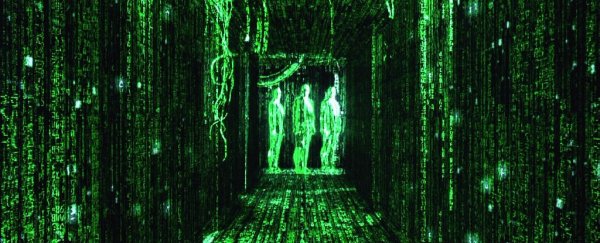Some of the world's top scientific minds have been busy debating one of the perennial questions of our time: are we in fact living inside a huge computer simulation? As our own efforts in developing artificial intelligence and virtual reality become more advanced, the question becomes even more relevant.
What makes the debate such an intriguing one is that it's almost impossible to prove either way, unless Laurence Fishburne shows up on your doorstep with a choice of red or blue pills. But even if a definitive answer might be out of our grasp for now, it doesn't mean we can't engage in a good, old-fashioned debate over the possibilities.
As Space.com reports, Neil deGrasse Tyson was joined at the debate in New York last week by MIT nuclear physicist Zohreh Davoudi, MIT cosmologist Max Tegmark, University of Maryland physicist James Gates, Harvard physicist Lisa Randall, and New York University philosopher, David Chalmers.
One hypothesis is that if we are living in a simulated universe, there must be tell-tale signs – only a bigger universe of infinite resources would be able to simulate another such universe inside it, and therefore our own one must be finite. For Zohreh Davoudi, one of these giveaways might lie in the study of cosmic rays, which would theoretically demonstrate glitches if they were computer-generated.
Computing is heavily based on maths, of course, as is our own Universe – so is there any proof there? Max Tegmark and James Gates have both been involved in studying the mathematical rules underpinning the natural world and think that if they go deep enough then we might find evidence of a computer simulation in the end.
"The more I learned about [reality] later on, as a physicist, the more struck I was that, when you get deep down into how nature works, down into looking at all of you as a bunch of quarks and electrons… if you look at how these quarks move around, the rules are entirely mathematical, as far as we can say," said Tegmark during the debate.
Gates said that some of the research he's done into the theoretical equations governing the laws of the Universe have "error-correcting codes" built into them, codes that suggest a computed universe.
"Error-correcting codes are what make browsers work, so why were they in the equations that I was studying about quarks, and leptons, and supersymmetry?" he asked.
When pressed, Lisa Randall said she believed there was a close to zero chance that we were living in a simulated universe. "To the extent that it gives us an incentive to ask interesting questions… that's certainly worth doing, to see what's the extent of the laws of physics as we understand them," she said.
David Chalmers, meanwhile, went as high as 42 percent in terms of the probability of whether we're all a simulation, but he doesn't believe we have much chance of finding out – "We're not going to get conclusive proof that we're not in a simulation, because any proof would be simulated," he said.
You can watch the whole debate below, and let's just say it's well worth it if you want to spend 2 hours thinking about this mind-boggling question.
